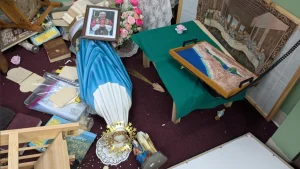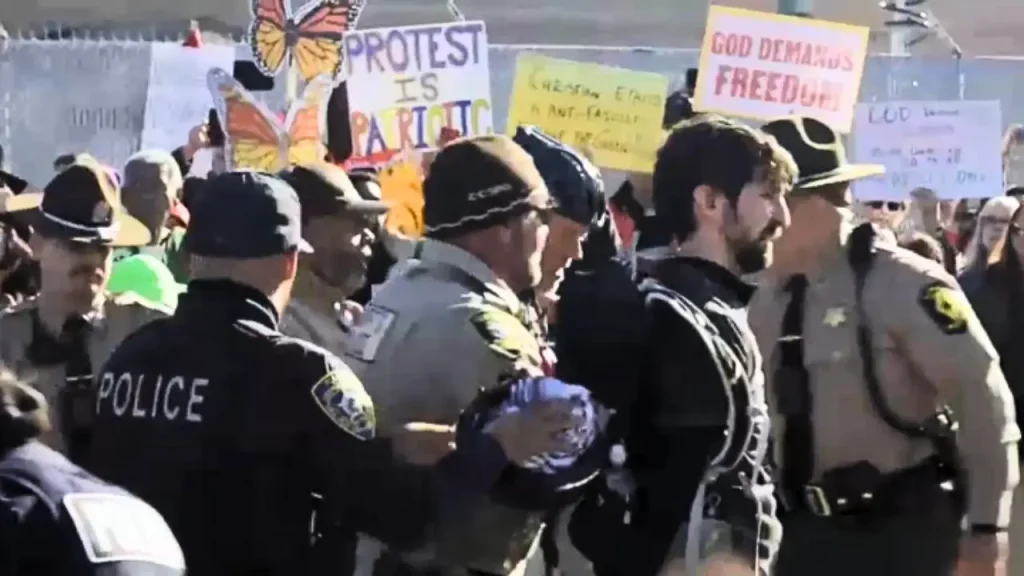Mayor Declares Emergency Amid Threats Following Immigration Protests
In the small village of Broadview, Illinois, a community typically untouched by national political tensions now finds itself at the center of a storm. Mayor Katrina Thompson declared a “civil emergency” on Monday, citing what she described as “serious and credible bomb and death threats” targeting village officials. The decision came after protesters, many from outside the community, threatened to storm Village Hall and shut down a scheduled board meeting. This dramatic step reflects the increasingly tense atmosphere surrounding immigration enforcement in suburban Chicago, where local governance has collided with national debates about immigration policy. The emergency declaration allowed officials to move the previously in-person meeting to an online format, prioritizing the safety of staff and residents over maintaining business as usual.
The threats against Broadview officials weren’t isolated incidents but part of an escalating pattern that has deeply concerned local authorities. According to village statements, the situation began with a telephone bomb threat targeting Village Hall on September 4, followed by a death threat against Mayor Thompson herself on October 13. The situation reached a boiling point last Friday when protesters attempted to force their way into Village Hall, vowing to disrupt Monday’s Board of Trustees meeting. The same day, demonstrations near the federal immigration processing center in Broadview turned violent, resulting in 21 arrests and injuries to four law enforcement officers, including two from Broadview’s own police force. “I will not allow threats of violence or intimidation to disrupt the essential functions of our government,” Thompson stated firmly, expressing her determination to protect both government operations and human safety amid the turmoil.
The roots of this conflict trace back to Thompson’s executive order from last month that placed restrictions on demonstrations near the Immigration and Customs Enforcement (ICE) facility in Broadview. The order limited protests to a designated area and permitted them only between 9 a.m. and 6 p.m., a move that civil liberties advocates, including the American Civil Liberties Union of Illinois, have criticized as an unconstitutional limitation on free speech rights. These restrictions have become a flashpoint in the ongoing national debate about immigration enforcement policies. As tensions escalated, local officials turned to higher authorities for assistance – the FBI has been notified and is reportedly investigating multiple threats against the mayor and her staff, signaling the serious nature of the situation confronting this suburban community.
The emergency declaration grants Mayor Thompson extraordinary powers to protect the community and maintain government functions without requiring board approval for security measures. Under the order, public meetings can be moved online indefinitely, though the village is making efforts to maintain public participation by accepting written comments through Village Clerk Kevin McGrier, which are then read into the official record. Police Chief Thomas Mills emphasized the difficult balance officials are trying to strike: “The safety of our officers and residents has to come first. We respect the right to demonstrate, but violence and threats cross the line.” This statement captures the central tension in Broadview – how to preserve democratic rights to protest while ensuring public safety and the continuity of essential government services for the community’s residents.
What’s happening in Broadview reflects a microcosm of larger national tensions surrounding immigration enforcement. The ICE processing center in Broadview has become a symbolic focal point where abstract policy debates transform into concrete conflicts between protesters, local residents, and authorities. The mayor’s emergency declaration represents a significant escalation in a community struggling to maintain order amid competing priorities and heated emotions. For Broadview residents, these events have transformed their village from a quiet Chicago suburb into ground zero for contentious immigration politics, bringing unwanted attention and disruption to daily civic life. The community now finds itself navigating unfamiliar territory, balancing constitutional rights with public safety concerns while under threat from forces largely beyond local control.
As Broadview moves forward under the civil emergency declaration, uncertainty looms about how long these measures will remain necessary. Mayor Thompson has indicated the emergency protocols will remain in effect until she determines that threats to officials and property have subsided, creating an open-ended situation dependent on factors that local officials may have limited ability to influence. For now, village business continues in this altered state, with residents adjusting to new realities of civic participation through digital means rather than in-person engagement. Behind the official statements and emergency measures lies a community of people – public servants, residents, business owners, and families – all affected by these disruptions to normal civic life. The story of Broadview illustrates how national political tensions can dramatically impact local communities, transforming routine government operations into flashpoints of conflict and turning small-town mayors and officials into frontline defenders of civic order in polarized times.















